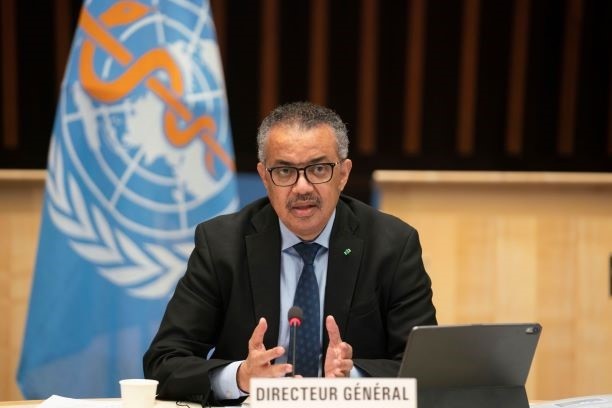
Omicron spreading faster than any other variant, warns WHO
Urging people not to dismiss the Omicron variant as mild and ignore COVID-19 precautions, the World Health Organization (WHO) on Tuesday warned that the highly transmissible Omicron variant was spreading at a rate not seen with any previous variant. And that the “sheer number” of Omicron cases could once again “overwhelm unprepared health systems”.

Urging people not to dismiss the Omicron variant as mild and ignore COVID-19 precautions, the World Health Organization (WHO) on Tuesday warned that the highly transmissible Omicron variant was spreading at a rate not seen with any previous variant. And that the “sheer number” of Omicron cases could once again “overwhelm unprepared health systems”.
At a media briefing, the WHO director-general Dr Tedros Adhanom Ghebreyesus pointed out that though 77 countries have now reported cases of Omicron, the reality is that Omicron is probably present in most countries without being detected. “Omicron is spreading at a rate we have not seen with any previous variant,” Tedros stated, adding that the organisation is concerned that people are dismissing “Omicron as mild”.
“… We’re concerned that people are dismissing Omicron as mild. Surely, we have learned by now that we underestimate this virus at our peril. Even if Omicron does cause less severe disease, the sheer number of cases could once again overwhelm unprepared health systems,” he asserted.
To counter Omicron, many countries were giving booster shots to their people but WHO has maintained there is clearly no proof to show that boosters can help in fighting this new variant. It would only lead to vaccine hoarding and more inequality in vaccine distribution around the world.
In the media briefing, Tedros stressed that “vaccines alone will not get any country out of this crisis”. According to the WHO chief, people should wear masks instead of taking vaccines. “It’s not vaccines instead of distancing. It’s not vaccines instead of ventilation or hand hygiene. Do it all…”, he advised.
Omicron is spreading at a rate we have not seen with any previous variant. I need to be very clear: vaccines alone will not get any country out of this crisis.
It’s not vaccines instead of masks, distancing, ventilation or hand hygiene.
Do it all. Do it consistently. Do it well. pic.twitter.com/YAVfJXsviQ— Tedros Adhanom Ghebreyesus (@DrTedros) December 14, 2021
Further, Tedros said that “evolving evidence” is surfacing that suggests that there is a small decrease in the effectiveness of vaccines against severe disease and death. And, there is also a decline in vaccines preventing mild disease or infection. He however made it clear that WHO is not against booster shots but they were against “inequity”. The international health agency main concern is to save lives everywhere not just in a few countries.
He felt that it was a matter of prioritisation and said that by giving boosters to groups at low risk of severe disease or death will end up endangering the lives of those at high risk still waiting for primary doses. But, if additional doses were administered to people at high risk then there were more chances of saving lives, said Tedros.
In their latest technical briefing too, WHO had warned that the new variant had a growth advantage over Delta and will “outpace” it. The WHO had suggested that a new variant could have a major impact on the course of the pandemic, but it was still too early to say for sure. It had limited data on this, WHO had admitted, even as it shed light on features of the new Covid-19 variant Omicron, including the extent to which it will spread, and the number of mutations in the newfound strain.
Preliminary findings from South Africa had suggested it may be less severe than Delta, and all cases reported in the EU/EEA to date have been mild or asymptomatic. But there are still questions about whether it is inherently less virulent.
The UN health agency also said that more information was required to fully understand the clinical picture of those infected with Omicron. And WHO had asked countries to contribute to the collection and sharing of hospitalised patient data through the WHO COVID-19 clinical data platform.

